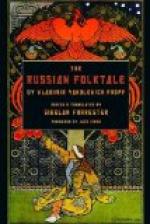2) Appeal to the associative imagination 46
a) Appeal to fancy 46
3) Appeal to the penetrative imagination 47
4) Appeal to the contemplative imagination 47
a) Philosophy in the fairy tales 48
b) Proverbs in the fairy tales 50
c) Relation of
the contemplative
imagination to science
52
c. A basis of truth, or appeal to the intellect 53
1) The truth must be idealistic 53
a) It may be realistic 53
b) It may be romantic 53
2) Value of the appeal
of literature to the
intellect
53
d. A form more or less perfect 54
1) The elements of
form: words, sentences,
paragraphs, and wholes
58
a) Words, the medium
of language must
have two powers
54
(1) Denotation,
to name what they
mean
54
(2) Connotation,
to suggest what they
imply
54
b) Suggestive power of words illustrated 55
2) General qualities
characteristic of perfect
form
57
a) Precision or clearness 57
(1) Precision
demands that words have
denotation
57
(2) Precision appeals to the intellect 57
b) Energy or force 57
(1) Energy demands
that words have
connotation
58
(2) Energy appeals
to the emotions and
holds the attention
58
c) Delicacy or emotional harmony 58
(1) Delicacy
demands that words have
the power of adaptation
58
(2) Delicacy
demands that form appeal
to the aesthetic sense
58
(3) Delicacy
is secured by selection and
arrangement of words according
to
emotional associations
58
d) Personality 58
(1) Personality
gives the charm of
individuality
58
(2) Personality
suggests the character
of the writer
58
3) Principles controlling
the elements
of form, principles of
composition 58
a) The principle of sincerity 58
(1) Sincerity demands a just expression 58
b) The principle of unity 59
(1) Unity demands a central idea 59
(2) Unity demands completeness 59
(3) Unity demands no irrelevant material 59
(4) Unity demands
method, sequence
and climax
59




